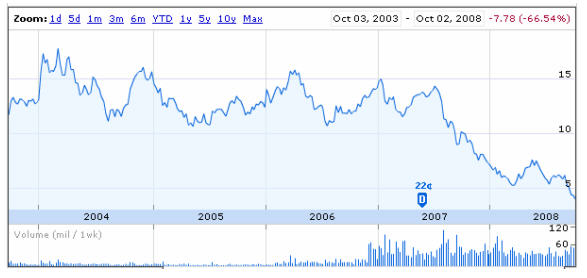By Jack Ganssle
Bell Labs
Published 10/08/2008
Bell Telephone Labs was formed from Western Electric and part of AT&T in 1925. Since then researchers there have earned six Nobel Prizes. For those who question the virtues of basic science, and ignoring the benefits of the existential quest for understanding of our world, one of those Nobels was for the invention of the transistor, the basic element that has made modern electronics possible. If the Labs had produced nothing else, that one new idea would justify their 83 year history.
I can certainly understand the business reasoning underlying this decision. Basic science is swell. So is world peace. Neither brings immediate profits. Alcatel-Lucent, Bell Labs' parent company, has been losing billions, and their stock tanked over the last year:

I'm sure management is in a panic to cut anything that doesn't immediately produce revenue. Management is, or at least should be, accountable to shareholders, most of whom demand ever-increasing quarterly profits.
The results of inventions at Bell Labs sometimes didn't blossom into profitable products for decades. Few businesses in these frenetic days have the will or stockholder patience to fund long- and even medium-term basic science. Hypercompetitiveness means squeezing every non-productive penny out of costs. So the universities and Federal agencies are fast becoming the last bastion of research.
Ironically, the titans of capitalism who disdain government intervention are placing all their bets for new science in the hands of the Feds.
Though I see no fix for this trend it comes with potentially great losses. Where did C come from? UNIX? The MOSFET, CO2 laser and CCD? Bell Labs.
The Labs were a haven for many well-known scientists. Jansky pretty much invented radio astronomy while researching noise in communication lines. Johnson and Nyquist explained thermal noise in resistors. Claude Shannon, Wilson, Penzias, Bardeen, Brattain, Shockley and many others did basic research there that has reshaped our lives.
Though I certainly understand the logic of Alcatel-Lucent's decision, and indeed might even do the same if faced with the prospect of doing research or making payroll Friday, it's sad to see the Labs' mission changed. This organization has been a fantastic national resource that did much to improve our world.

